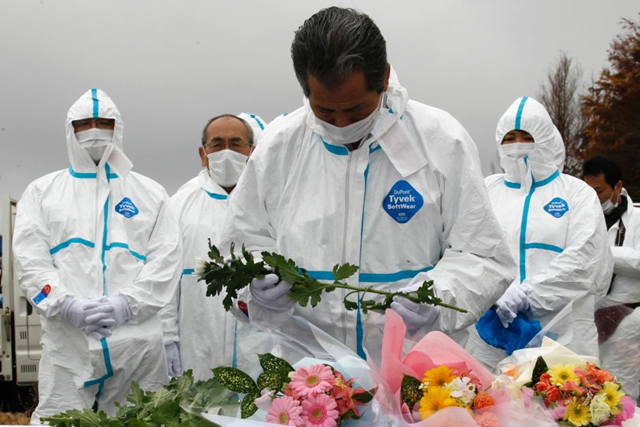TEPCO admits Fukushima nuclear plant leaking radioactive water into Pacific ocean
TOKYO, 22 July 2013 (AFP) – The operator of the crippled Fukushima nuclear plant on Monday admitted for the first time that radioactive groundwater has leaked out to sea, fuelling fears of ocean contamination. The admission came the day after Japanese voters went to the polls in an election for the upper house, handing the largely pro-nuclear party of Prime Minister Shinzo Abe a handsome majority. Earlier this month Tokyo Electric Power (TEPCO) said groundwater samples taken at the battered plant showed levels of possibly cancer-causing caesium-134 had shot up more than 110 times in a few days. TEPCO did not know the exact reasons for the increased readings but had maintained the toxic groundwater was likely contained at the current location, largely by concrete foundations and steel sheets. “But now we believe that contaminated water has flown out to the sea,” a TEPCO spokesman said Monday. However, the spokesman insisted that the impact of the radioactive water on the ocean would be limited. “Seawater data have shown no abnormal rise in the levels of radioactivity.” Radioactive substances released by the meltdowns of reactors at the plant in the aftermath of the huge tsunami of March 2011 have made their way into underground water, which usually flows out to sea. Environment experts warn that such leakage may affect marine life and ultimately impacting humans who eat sea creatures. [more]
Radioactive water leaked into sea at Fukushima 
By Mari Yamaguchi
22 July 2013 (AP) – A Japanese utility said Monday its crippled Fukushima nuclear plant is likely leaking contaminated water into sea, acknowledging for the first time a problem long suspected by experts.
Tokyo Electric Power Co., which operates the Fukushima Dai-ichi plant, also came under fire Monday for not disclosing earlier that the number of plant workers with thyroid radiation exposures exceeding threshold levels for increased cancer risks was 10 times what it said released earlier.
The delayed announcements underscored the criticisms the company has faced over the Fukushima crisis. TEPCO has been repeatedly blamed for overlooking early signs, and covering up or delaying the disclosure of problems and mishaps.
Company spokesman Masayuki Ono told a regular news conference that plant officials have come to believe that radioactive water that leaked from the wrecked reactors is likely to have seeped into the underground water system and escaped into sea.
Nuclear officials and experts have suspected a leak from the Fukushima Dai-ichi since early in the crisis. Japan’s nuclear watchdog said two weeks ago a leak was highly suspected and ordered TEPCO to examine the problem.
TEPCO had persistently denied contaminated water reached the sea, despite spikes in radiation levels in underground and sea water samples taken at the plant. The utility first acknowledged an abnormal increase in radioactive cesium levels in an observation well near the coast in May and has since monitored water samples.
Ono said plant officials believe a leak is possible because the underground water levels in suspected areas fluctuate in accordance with tide movements and rainfalls.
“We are very sorry for causing concerns. We have made efforts not to cause any leak to the outside, but we might have failed to do so,” he said.
Ono said the radioactive elements detected in water samples are believed to largely come from initial leaks that have remained since earlier in the crisis. He said the leak has stayed near the plant inside the bay, and officials believe very little has spread further into the Pacific Ocean.
Marine biologists have warned that the radioactive water may be leaking continuously into the sea from the underground, citing high radioactivity in fish samples taken near the plant.
Most fish and seafood from along the Fukushima coast are barred from domestic markets and exports.
Ono said that an estimated 1,972 plant workers, or 10 percent of those checked, had thyroid exposure doses exceeding 100 millisieverts – a threshold for increased risk of developing cancer – instead of the 178 based on checks of 522 workers reported to the World Health Organization last year.
Fukushima nuclear plant leaking radioactive water into ocean 
By Mark Willacy, North Asia Correspondent
22 July 2013 (ABC News) – The operator of Japan’s crippled Fukushima nuclear plant has admitted for the first time that radioactive groundwater has leaked out into the Pacific Ocean. The Tokyo Electric Power Company (TEPCO) has been battling for months to stop groundwater leaking into the complex and becoming contaminated. Now the company has admitted that radioactive water from the site has leaked into the sea, although a spokesman insists the impact on the ocean will be limited. Earlier this month TEPCO revealed that groundwater samples taken at the Fukushima plant showed that levels of radioactive caesium had increased by more than 100 times in just a few days. The company acknowledged that it had no explanation for the soaring figures. The head of Japan’s Nuclear Regulation Authority believes contamination of the sea has been continuing since the explosions at Fukushima following the 2011 tsunami. TEPCO had previously failed to confirm the ground water leakage, more than two years after the worst nuclear accident since Chernobyl in 1986. “We would like to offer our deep apology for causing grave worries for many people, especially for people in Fukushima,” Masayuki Ono, TEPCO’s general manager, told a news conference. The March 2011 earthquake and tsunami knocked out cooling systems at the Fukushima plant, triggering fuel meltdowns and causing radiation leakage, food contamination and mass evacuations.
Fukushima operators admit radioactive water is leaking into Pacific
